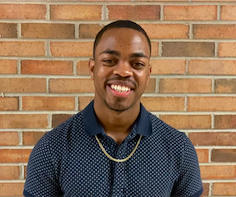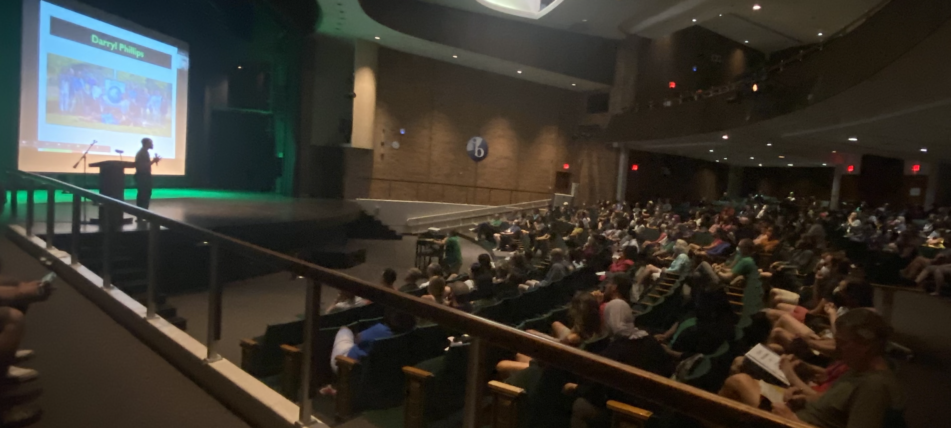AAPS: 2020 Huron graduate says the IB Career-related Program changed his life

By Jo Mathis/AAPS District News
Darryl Phillips says he wouldn’t be where he is today if it weren’t for the education and support he received at Mitchell, Scarlett, and Huron, which offers the first PreK-12th IB Continuum with all four IB programs in North America.
Not only is the 2020 Huron graduate studying fashion marketing innovation on a full scholarship at Eastern Michigan University, but he’s also a manager at the restaurant he bussed just four years ago, and runs his own online clothing company.

On Tuesday, Darryl morning spoke to teachers from Mitchell, Scarlett, and Huron—the district’s International Baccalaureate schools—about his path so far. He recalled how he and his younger brother were raised by a struggling single mother in Ypsilanti who wanted her sons to attend Mitchell/Scarlett/Huron. He talked about the struggles it took simply to get to school, and how the walk down Fernwood from the bus stop on Packard seemed particularly long during the polar vortex.

Speaking without notes and with conviction and confidence, he gave a shout-out to principals and teachers who supported him every step.
And he recalled when—at the urging of his former principal and current AAPS head of IB Kevin Karr, he and his mother attended a meeting about the district’s plans to introduce the Career-related Program at Huron.
“By the end of it, we’re looking at each other like Mr. Karr has just dropped gold in our laps,” he recalled, prior to his speech. “This is exactly what I’ve been looking for. I’m looking for success. I’m looking for stability. And he’s giving me this program, this new way of learning with these values, these I. B. learner traits— knowledgeable, inquirers, open-mindedness.”
“The programs put in place at AAPS—the IB program—taught me so many valuable skills that I was able to apply to my life,” he told the crowd. “And it’s gotten me and it’s made me the man that I am today.”
Thanking Mitchell/Scarlett/Huron staff by name, he added: “Without you and without this program, I don’t know where I’d be.”
Darryl—who was in the first group to ever receive the CP Certificate in the State of Michigan—was the first student to sign up for CP. He switched from engineering to business when he realized that was his passion, then taught himself Adobe Illustrator to make posters and social media links for his advocacy projects centered on racial inequality, climate change, and gender inequality. Justifiably impressed with his work, he figured he could take it a style further, and created a line of clothing. Meanwhile, he attended a Hospitality workshop, where he was offered his first job at Sava’s restaurant.
During his junior year, he recalls the time he felt overwhelmed with financial obstacles to college during a CP advisory period, and CP teacher Christy Garrett asked how he was doing, listened, and cried with him.
Then she helped him apply for colleges and celebrated with him when he was accepted into each.
While Darryl’s story is impressive, there are many other successful graduates of the program, Garrett said.
“We have story after story after story,” she said. “We’ve now graduated three cohorts of CP students that are in universities and starting businesses and working in industry. And I’m just as equally proud, and you’d be blown away by all of them as you are by Darryl. I’m just incredibly proud of having Darryl up on stage and everyone getting to see the fruits of the investment in this IB program, and just getting to see in a visceral, in-your-face way how that investment can pay off.”
Garrett noted that CP is particularly rigorous. While IB course students take Diploma Programme (DP) courses as they are interested, and DP students take six DP courses and complete the DP Core Advisory course, Career-related Programme (CP) students such as Darryl take two or more DP courses, complete a career-related study, and complete the CP Core Advisory course.
Garrett said that when AAPS decided to take on the IB Continuum and launch the CP program, it reached kids already taking courses in business, engineering, culinary arts, auto, cosmetology, and homebuilding.
“Instead of just paying lip service to being IB, they actually walk the walk about access and equity,” she says. “How do I get kids in honors programs who might not traditionally choose an honors program? And how do you get these really high-achieving kids who may not be able to do full DP because of engineering and choir and orchestra to actually be in an honors program?”
A daily Advisory period of CP students representing all fields is incredibly powerful, she says.
“We build a community, we build a family, and in that day-to-day support system, you really get to know each other,” she says. “So a student like Darryl who may not have talked to a bunch of these other students (in other fields of study), he teaches and inspires them, and then he learns from and is inspired by them. It’s a dream job for me to be that person who’s in the room with them every day.”
Kevin Karr now heads the district IB program, but was principal at Mitchell Elementary when Darryl was in fourth and fifth grades there.
“From those very early moments I saw a student who had everything he needed to be successful, and so it was really important to me, to (Scarlett Principal) Gerald Vazquez, and to the team at Huron to make sure that we were connecting with him as he went through Mitchell, Scarlett, Huron and help him find his way to success.”
During his talk, Darryl occasionally looked at his brother, Kevin, a Huron High junior, who was sitting near the stage.
“I just wanted to show my younger brother that he has the ability to choose how to live his life,” he says.
Darryl said he was pleased with the audience’s response at Huron Tuesday.
“My goal was to connect human to human and show just how big of an impact the tools and systems put in place can have,” he says. “Being up on the stage my main priority was to get the audience engaged and tell them a story and at the end of the day I wanted people to leave the auditorium knowing that they have the power to really impact their students’ lives.”

























